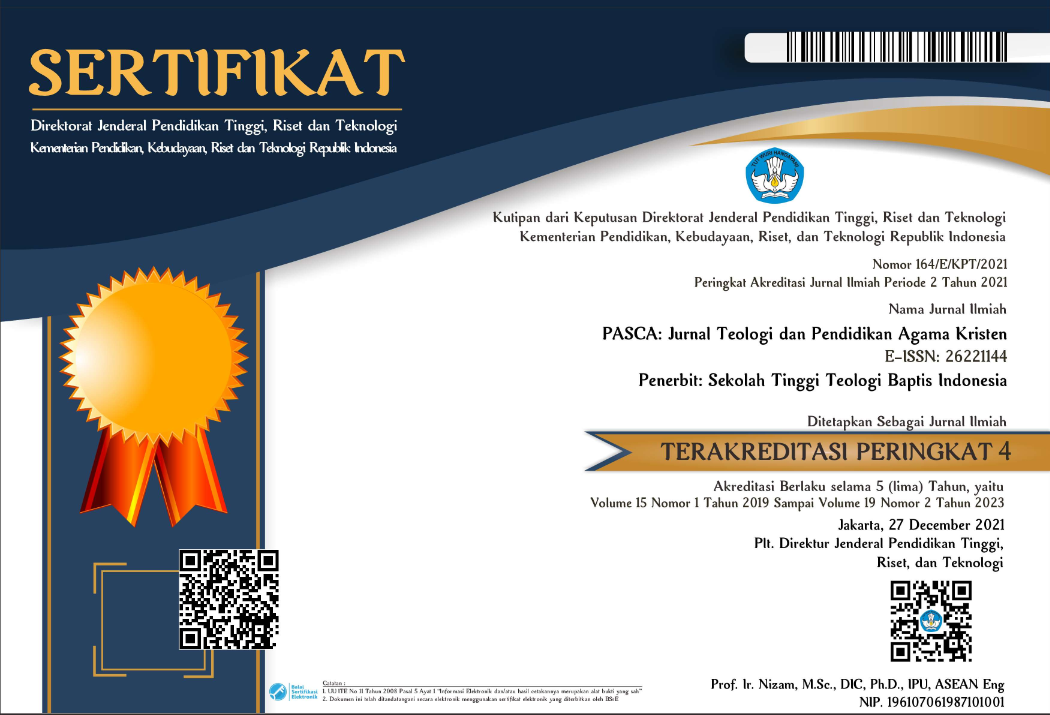Christology in Digital Era: A Socio-systematic Theology Contribution to the Sustainable Smart Society
DOI:
https://doi.org/10.46494/psc.v16i1.70Keywords:
theology, technology, digital era, cybertheology, christology, systematic theologyAbstract
Theology, specifically speaking, Christology, owns exclusive position and tends react sentimentally toward secular disciplines out of its circle. Therefore, linking Christology and digital era falls to practical matter on how modern devices could be employed for religion advantages. This essay tries to evaluate reconciliation between them and see possibilities on how Christology could contribute to the sustainable smart society. However, divinity and technology are contrast square that offers less of space for dialogue, furthermore, it receives pessimistic tone concerning their health relationship. The expectation is, a socio-systematic sensitive approach of Christology may ground new perspective and results unexpected knowledge for the sustainable of smart society.
References
Albrecht, Janico, Christopher Degelmann, Valentino Gasparini, Richard Gordon, Maik Patzelt, Georgia Petridou, Rubina Raja, Anna-Katharina Rieger, Jörg Rüpke, Benjamin Sippel, Emiliano Rubens Urciuoli & Lara Weiss. “Religion in the Making: The Lived Ancient Religion Approach.” Religion, Routledge: Taylor and Francis Group (2018).
Armfield, G., & Holbert, R. “The Relationship between Religiosity and Internet Use.” Journal of Media and Religion 2, no. 3 (2003): 129–144.
Bavinck, Herman. Reformed Dogmatics: Volume 3: Sin and Salvation in Christ. Grand Rapids: MI, Baker Publishing Group, 2006.
Bevans, Steven. Models of Contextual Theology. New York: Orbis Books, 2012.
Bockover, M. “Confucian Values and the Internet: A Potential Conflict.” Journal of Chinese Philosophy 30, no. 2 (2003): 159–175.
Burger, Hans. Being in Christ: A Biblical and Systematic Investigation in a Reformed Perspective. Eugene, Oregon: WIPF & STOCK, 2009.
Communications, Pontifical Council for Social. “The Church and the Internet.” Accessed March 24, 2020. http://www.vatican.va/roman_curia/pontifical_ councils /pccs/ documents %09/rc_pc_pccs_doc_20020228_church- internet_en.html. .
Le Duc, Anthony. “Cybertheology: Theologizing in the Digital Age.” SSRN Electronic Journal (2016): 3,4,8.
Efiong, John. “Theology and Information Technology.” Methodist Journal of Theology 2, no. 1 (2015): 160–179.
Ende, Jan Van Den, Mulder, Karel, Knot, Marjolijn, Moors, Ellen and Vergragt, Philip. “Traditional and Modern Technology Assessment: Toward a Toolkit.” Technology Forecasting and Social Change 58 (1998): 5–21.
Herman, Bavinck. Reformed Dogmatics: Volume 2: God and Creation. Grand Rapids: MI, Baker Publishing Group, 2004.
Humphreys, S. C. “Ancient Theologies and Modern Times.” Centre International d’etude de la religion grecque antique 25 (2012): 149–161.
II, Pope John Paul. “Message for World Communication Day 2002.” Last modified 2002. Accessed March 24, 2020. http://w2.vatican.va/content/john-paul-ii/en/messages/communications %09/documents/hf_jp-ii_mes_20020122_world- communications-day.html. .
J.C, Swearengen. Beyond Paradise: Technology and the Kingdom of God. Eugene: WIPF & STOCK, 2007.
Kamphuis, Barend. “Herman Bavinck on Catholicity.” MAJT 24 (2013): 97–104.
Kluver, Randolph and Cheong, Pauline Hope. “Technological Moderization the Internet and Religion in Singapore.” Journal of Computer-Mediated Communication 12 (2007): 1122–1142.
Lu, Luo and Kao, Shu-Fang. “Traditional and Modern Characteristics Across the Generations: Similarities and Discrepancies.” The Journal of Social Psychology 142, no. 1 (2002): 45–59.
Mondragon, Carlos. Like Leaven in the Dough: Protestant Social Thought in Latin America, 1920-1950. UK: Rowman and Littlefield Publishing House, 2011.
Morelli, Elizabeth A and Mark Morelli D., Ed. The Lonergan Reader. Toronto: University of Toronto Press, 1997.
Norris, P., & Inglehart, R. Sacred and Secular: Religion and Politics Worldwide. Camridge: Camridge University Press, 2004.
Owen, John. Meditation and Discourse on the Glory of Christ. Grand Rapids: MI, Baker Publishing Group, 1965.
———. Of Communion with God the Father , Son and Holy Ghost by Publisher?: Description?: Grand Rapids: MI: Christian Classics Ethereal Library, 1657. http://www.ccel.org/ccel/owen/communion.html.
Schuurman. “Technology and Religion: Islam, Christianity and Materialism.” Koers 76, no. 2 (2011): 373–386.
Singh, M. Peter Singh. An Overview of Cybertheology. Seminar on Ekklesionlogy in Cyber Age, 2014.
Spadaro, Antonio. Thinking Christianity in the Era of the Internet. New York: Fordham University Press, 2014.
Webber, Max. The Protestant Ethic and the Spirit of Capitalism. London, New York: Routledge, Taylor & Francis Group, 1992.
XVI, Pope Benedict. “Message for World Communication Day 2013.” Last modified 2013. Accessed March 24, 2020. http://w2.vatican.va/content/benedict-xvi/en/messages/communications/ %09documents/hf_ben- xvi_mes_20130124_47th-world-communications-day.pdf.
Yonda, Dominikus Riki. “Social Transformation on Traditional Society.” In International COnference on Ethics of Business, Economics, and Social Science, 452–460, 2016.
Published
How to Cite
Issue
Section
Copyright (c) 2020 PASCA : Jurnal Teologi dan Pendidikan Agama Kristen
PASCA: Jurnal Teologi dan Pendidikan Agama Kristen is licensed under a Creative Commons Attribution-ShareAlike 4.0 International License.




























